Enter The Master’s Cellar…
As mentioned in my biography pages, I connected with the near-legendary Dave Hassell at a time in my life when it was unclear whether or not there would be a future for me playing drums. After Tendonitis in my right hand made its unwelcome presence felt, every gig was played with the fear that it would show itself again at the most inopportune of moments. Thanks to a chance moment in October 1995, on a coach back from the Birmingham hosted ‘Zildjian Day’, my future drumming prospects were about to get a lot better – as long I was prepared to put the work in. It was London drummer Andy Willis (resident in Liverpool at the time), who suggested that my problems could almost certainly be cured by Royal Northern College of Music percussion tutor, Dave Hassell, infamous for not suffering fools or idle students. Drinking in the last chance saloon, the prospect of taking instruction from an ogre was the least of my worries so I didn’t hesitate in seeking a rendezvous.
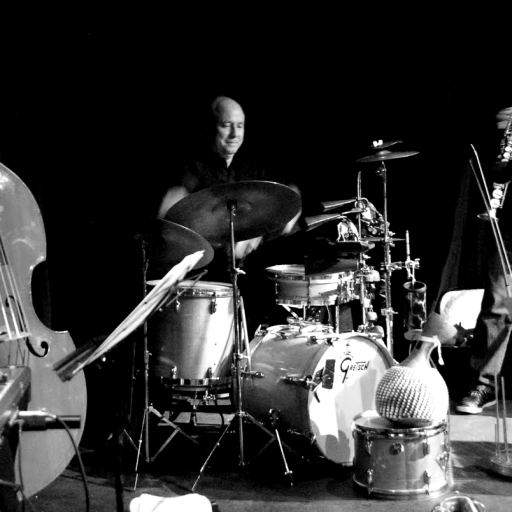
Entering the cellar of Dave Hassell for the first, an aura of mysterious bohemia hit me; unaccustomed as I was to being surrounded by vintage drum and percussion equipment, flanked by a perimeter of wall-to-wall books and hours of vinyl. Within 10 minutes, Dave deduced that my Tendonitis problems stemmed from 14 years of poor hand technique, focusing specifically on my grip. Whereas I was able to draw the sticks from his hands at any point whilst he was playing on a practice pad, he practically had to wrench them from my hands, as though they were joined to me in a desperate act of life-support. The truth was, all those years of superglue grip had done nothing more than to serve me a slow meal of death-by-tension. It was time to change things; but this was to be a personal journey comparable to no other I had taken.
Healing my hands would necessitate a process of throwing away everything previously learned about physically playing the drums and then reprogramming me. Thus started my fortnightly visits where I would be shown the methods of Sanford Moeller, Henry Adler and George Lawrence Stone. My homework involved a lot of sitting in front of a large mirror with sticks and practice pad, slowly performing unfamiliar, exaggerated hand and arm exercises, so my brain rewired itself to the new movements. Most importantly, my hands would learn a seemingly unfeasible method of holding drum sticks without involving any grip. The combination of taking on Dave’s physical and mental concepts would tear my head apart, exacerbated by the necessity to keep playing my instrument in a professional capacity whilst trying to implement drastic changes.
After many frustrating months of homework practice sessions (“little and often”), my next goal was to concentrate on achieving dynamics within performance. The concept of ‘bandwidth’ in music was introduced, analogous to the natural act of talking. If we use our voice in everyday situations to whisper, speak and shout, then why should we approach playing music differently? A simple but obvious concept; yet overlooked by so many (including myself) who limit themselves to speaking with only one voice on a musical instrument. The hardest part of using the ‘bandwidth’ theory within real-world musical situations is having the facility to execute it. Before studying with Dave, my ‘one-size-fits-all’ approach had confined me to playing drums at a singular dynamic. Once I had crossed the line and started playing as ‘new me’, the door opened to a reality where it was possible to play at a ‘normal’ level, whilst retaining the ability to turn up the volume – or take it right down, as the music required. Not only was my Tendonitis history, I had gained the ability to respond dynamically to music, no matter how loud or quiet the situation. For want of a better word, it was a feeling of ‘rebirth’; emerging from a dark tunnel at the end of which, Dave Hassell stood with a lantern.
Stories and myths have proliferated over the years regarding Dave’s teaching techniques; yes, he’s a hard task master; but for the student who wants to make the change, who wants to put the gruelling work in, he will reward them as he puts it, by “opening doors into dark rooms and switching the lights on.” Although it’s been quite a few years since I visited his teaching cellar, the fact remains; without his tutelage and life-changing remedy, there would be no ‘me’ playing drums today. If you don’t believe a teacher can be that influential, just ask anyone who’s studied under him and come out the other end a better musician. The list is impressive.
In conclusion, my favourite piece of advice that Dave passes on to students goes something like:
Learning is like crossing the Sahara desert. If you look at it and say, ‘Right, I’m going to cross that desert’, you’re really going to be thinking, ‘No I’m not’. But if you say, ‘No, we’ll just go a hundred yards today and make camp, we’ll enjoy the scenery; then a hundred yards the next day…’ then you’ll make it.
Dave Hassell

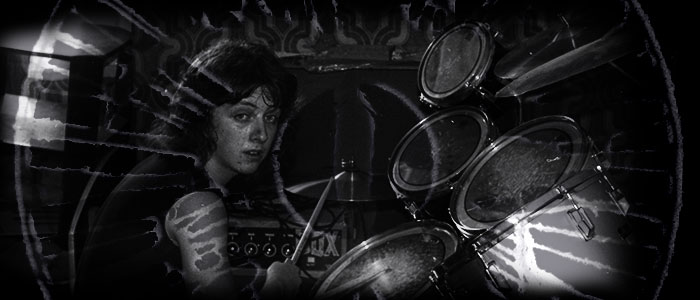
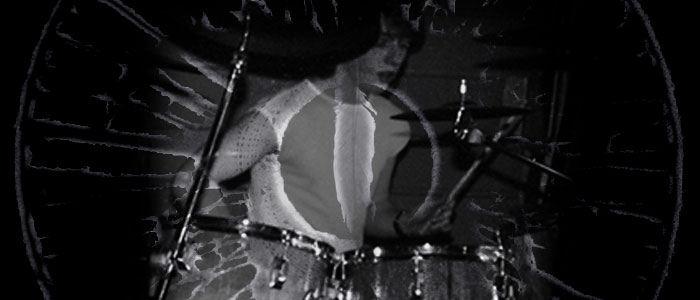
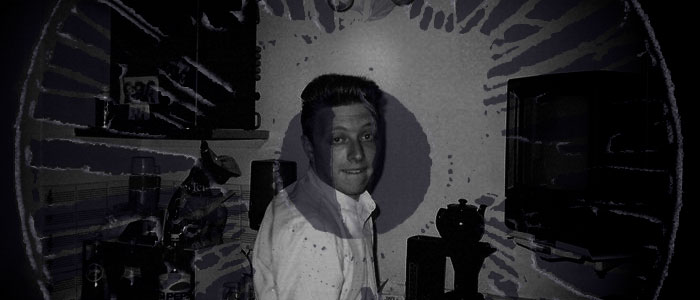

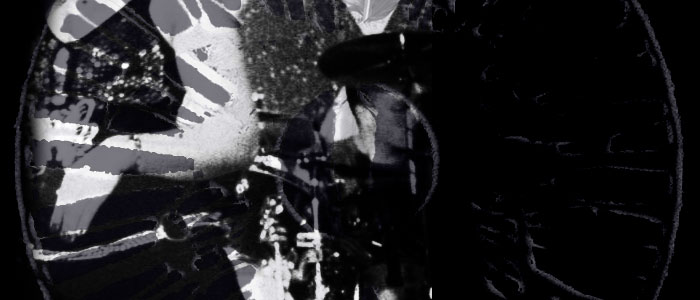

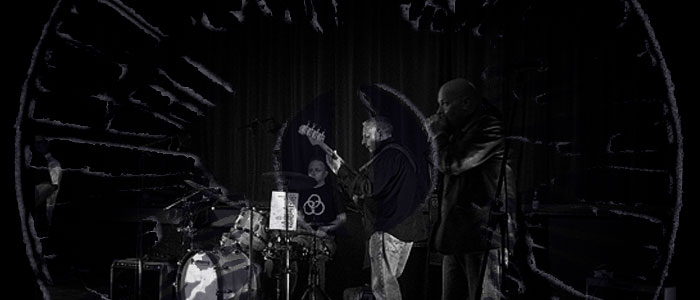
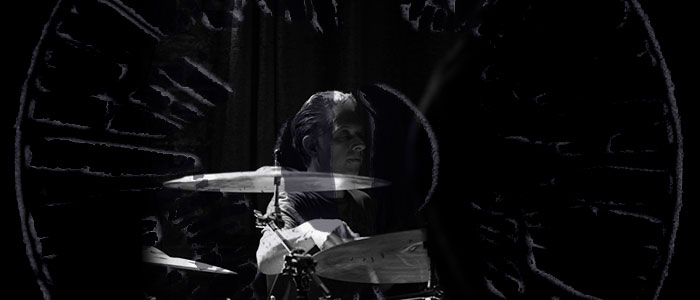
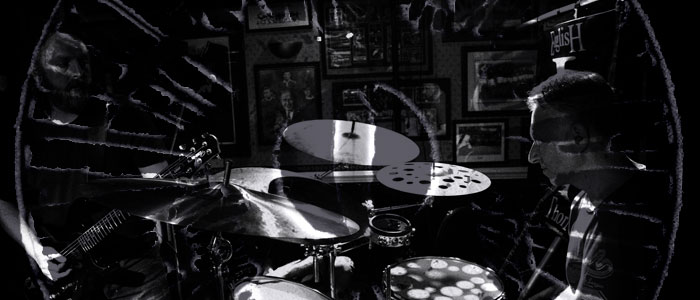
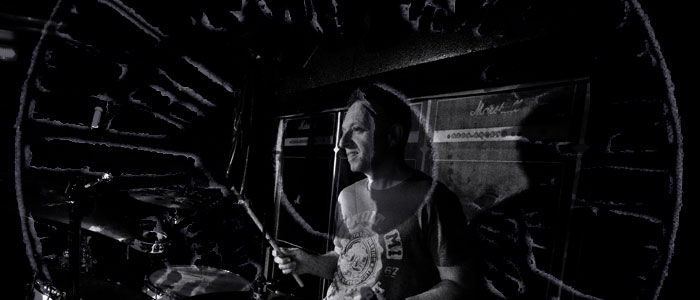
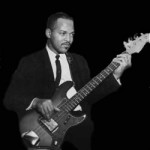
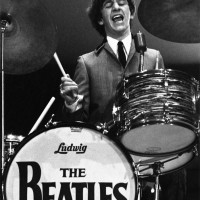
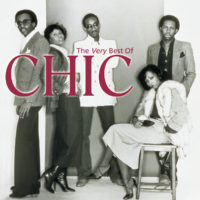


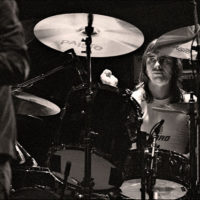

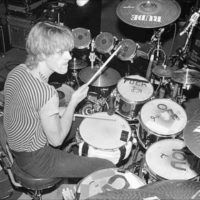


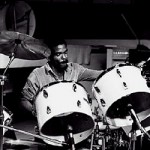

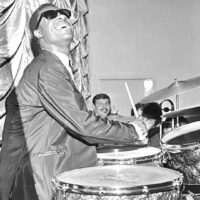
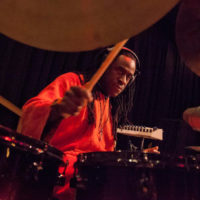


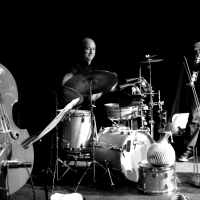
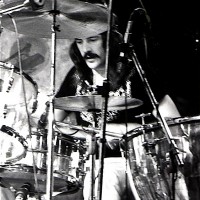
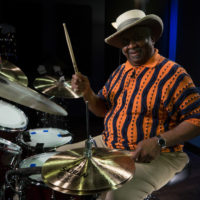
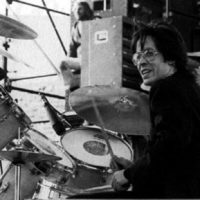
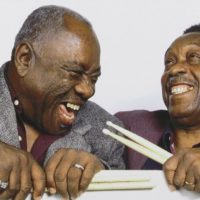
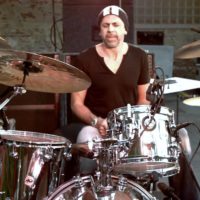


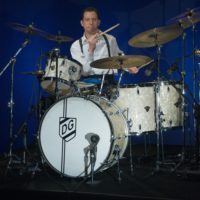

This is so true. I have recently begun tutorials with Dave. The man is a genius. I’m pretty new to drumming but have been playing about 18months and feeling like I was getting nowhere. I found Dave by some process of the planets moving in a strange direction that led me to Manchester where Dave was waiting with his proverbial lanterns and closed around me in his inimitable and vaguely mysterious way. It’s about dedication and if you have that Dave will show you out of the quicksand and on to dry land. No kidding!
Yep…Hassell is the man, no question.
If you put in with Dave, you will get rewarded. He’s only harsh on people who think they know it all and clearly don’t. Mind you, finding Dave is usually done after a lot of searching out the wrong answers so it must be meant to be. Enjoy the journey; he opens doors that give you the ability to discover things your ears didn’t know they could identify – and it doesn’t stop, even after you have come to the end of studying with him.
Yes… so far I’ve had two lessons with Dave and my understanding of listening, and how to listen the Dave Hassell way, has opened new vistas in understanding the musicality inherent in playing the kit, which is, after all, a musical instrument. You do need to put the work in and when you do you are rewarded by the Dave Hassell smile, which I’m sure you know well.
My swing has improved markedly.
Latin wise, I’m constantly hearing, in my head, the ‘I don’t like cabbage, I like potatoes’ mantra.
Believe it or not I am going up to Manchester for a lesson today, but before I go I did want to reply and thank you for your blog, hopefully it will turn more people on to the genius that is… Mr Hassell.
I think when people connect with Dave it’s ‘meant to be’, as though some other-worldly force was directing! Maybe we are meant to be the future ambassadors of his teaching? After all, he did say to me during one lesson, “well somebody’s got to carry it on…“
You are right about carrying on the teachings of Dave. he is arguably a drum ‘guru’ to many people, me included. Had a lesson on Thursday and I came out of it dizzy! I thought my swing had improved…wrong…it is improving but that improvement is incremental, meaning the ‘bandwidth’ is continually growing, exponentially, as I take on board the inner meaning of the sound that’s being produced. The subtleties of playing are unbelievably deep and the more you listen to what Dave is saying about musicality and attempt to convert his knowledge into playing the more the realisation dawns that the journey into playing is a ‘worm’ hole of incredible proportion.
One final thing, as I was sitting behind the kit wondering why I was becoming more and more confused by what I was attempting Dave, casually, remarked “Ah, that’s a classic example of too much analysis causing paralysis”, and he was absolutely right.
I think it’s impossible to take everything in and see the fruits immediately. Things will surface years later when you least expect them, almost subliminally and you’ll realise you were able to do it because you now have the facility. It takes time for it to all channel through and you will discover things about yourself as a musician, many years from now. The journey doesn’t stop either, it’s like a constant evolution that you would never had been able to invoke yourself. Definitely the best decision any drummer seeking a new path could take.
Agreed. I hope you won’t mind me sharing the experience. Attempting to ‘take it all on board’ is a mistake I have made and, to my cost, realised is doomed. Another lesson on Thursday gone(11th of December) with Dave. Doing triplets, sounds simple doesn’t it? I won’t go into the ‘freeze’ I experienced during playing but, I don’t know, somehow with Dave the concepts and realities of finding ‘your own sound’ are brought into sharp focus and the feel somehow changes from being ‘oh right triplets’ to ‘err… triplets? how does that go? Feel being the key here, not playing as such but feeling the subtelties in the sounds you’re making… no two sounds the same. Something Dave brings to the table is the humility of playing the feeling coupled with the privilege of being in the presence of a deeply qualified and tremendously laid back teacher.I hope this makes some sense as I’m still ‘spaced out’ from the lesson.
If you weren’t coming home from lessons feeling spaced out, then he’d identify that it wasn’t working and you weren’t paying attention! If that was the case, he would have stoped teaching you long ago. He’s obviously opened the door and the light has gone on for you in the dark room. Despite how hard it is, I reckon you’re ‘getting it’. Lots don’t, and come home after 2 lessons, never wanting to go back.
It is a privilege, indeed, to be one of the lucky ones who can stay on the path.
Yes, it’s true that being ‘spaced out’ is the, necessary, symptom of progress, or at least the learning process with Dave. I’m still trying to ‘get’ the triplet accents Dave has given me for ‘homework’! I thought it would be challenging, which it is, but I never, for one second, realised how life changing it would be.
Back for more ‘fuel’ on the 22nd of Jan. Thanks for a great oportunity to share my thoughts, on a great blog.
All the best for Christmas and wishing you a brilliant, drum filled, 2015!
It’s always good to get positive feedback here and who knows, others may also benefit. Best wishes for the coming year, I’m back to working on single pedal technique that I neglected in the 90’s…
Pedal technique… another area of challenge for me. Trying to play ‘quietly’ on the bass drum whilst keeping everything else at a different level is my challenge currently. I recall Dave doing this thing with all four limbs where he changes each limb from ‘soft’ to loud’ alternately, what he terms ‘turning the volume up and down, it still has me baffled.
All the best with the single pedalling workouts.
I’d be really interested to know how it goes and any tips you might have on ‘toe’ or ‘heel’ foot technique, in the sense of what works for which patterns.
Just reading a book called ‘Drummin Men’ by Burt Korall about BeBop drummers, there’s a nice quote from Max Roach…
…’You can’t take the instrument lightly!, the drum set is very difficult to really master.There’s so much to the whole process. Just the coordination of wrists,arms, and legs, in various rhythmic circumstances, is challenge enough’.
Great book, which I would thoroughly recommend to any aspiring jazz player.Best wishes.
Well…I’ve just got the JoJo Mayer DVD on Bass drum technique and it does appear, that his foundation starts with heel-down and works from there introducing other techniques. It is a great educational release and I’d thoroughly recommend it if you want to revamp/refresh your foot technique.
I have problems because a few years ago, I slipped a disc lifting a vintage Yamaha 9000 Bass drum very awkwardly, resulting in the trapping of my Sciatic nerve and extreme pain. The by-product of this was, all the nerves that supplied information to the muscles in my right leg that performed the function of enabling me to stand on tip-toe, were disabled. Imagine trying to stand on tip-toes on one leg and being unable to do so….weird feeling and horrible.
Luckily, I had been practising a lot of heel-down exercises for a few months prior to the incident and thus, was able to continue playing heel-down and with use of the slave-side of a double-pedal. However, all of any Bass drum techniques such as heel-toe or rocking motions were disabled, due to having no brain signals reaching the muscle groups that performed that function. It was months and months before I could stand on tip-toe again and I was left with some numbness in two of my toes. The end result is, I now play from the heel down position and have never regained the ability to do heel-toe technique. The brain can find ways so reconnect severed nerves to muscle groups via alternative routes, but I’ve never been the same – though I’m grateful to still be playing.
But, I am working on as much as I can to develop and improve dexterity from a heel-down position, hence the Mayer DVD purchase. I don’t think I’ll ever be able to play along to ‘Good Times Bad Times’ and hit those Bonham triplets with the same power or accuracy as the original was played (heel-toe on a Speedking), but when I get asked to play that song it’s always taken the Carmine Appice route!
We can’t be everything to every music all of the time, it’s an impossible task so sometimes one needs to take workarounds to the solution.
Oh yes….I don’t lift heavy objects above my waist any more and the 9000 kit went long, long ago.
Sorry it’s taken me awhile to post, I’ve been a bit unwell, stress and stuff… life gets to us all at some point. I actually missed one session with Dave but did a three hour non stop tutorial with him on Thursday the 5th of Feb.What a blast…learned a huge amount more from Dave regarding brush work. Thanks a million for your recommendation of JoJo’s DVD I will get it asap.Sorry to hear about the numbness but you’re soldiering on through it all which shows great dedication and determination… may I wish you a pain free kick drum experience… I honestly find your comments inspiring and there have been times when I have felt like giving up but between Dave and your blog I’ve carried on and now with what you have said here I’m even more determined to improve my feel on the bass pedal and continue my drumming journey…you never know what’s round the corner…many thanks for your frankness and inspiring blog…John Bonham…what can you say…a much missed genuine innovator… I’m off for another three hours with Dave on the 26th I’ll leave a post regarding that session and any tips he passes on which are always plentiful, and all appear in his ‘Big Blue Book’,…I’m actually amazed that no one else is joining in??? Look after yourself…Hugo.
I need to get back to this BLOG more often to reply….! Too many songs to learn for dep gigs preventing me from writing.
I get where you are right now – as the learning process is tumultuous – do we ever stop beating ourselves up to get better? I don’t think so. I often have periods of doubt about my own ability and bad days behind the kit when I wonder whether or not I should lock the kit away and carry on trying to learn Bass guitar! But I think that’s the nature of all musicians, the battle for improvement and never being satisifed enough to keep still. It’s all part of the creative urge. My mum was an artist and was never happy with her work, despite blowing people away with what she painted, drew and wrote. It’s definitely that creative timebomb ticking away in the background, but never reaching the point where it goes off!
I think though, you should when possible, step away from the self-critical pressure that we put ourselves through and just concentrate on playing music with people, not worrying about perfection, just going with the flow and the moment. Remember, mistakes made on stage all happen in the past. Some mistakes have made it onto multi-million selling albums (I can find a few Bonham fluffs, believe me!)
I don’t know how many of us (Dave’s students) there are around to be honest. Some people have studied with him and found him too harsh so you get to hear that side as well. However, I was playing a few gigs at the end of last year at a restaurant venue in the centre of Manchester and we had a sound guy who was also a percussionist. He happened to comment on my shuffle feel to which I replied, “I had a great teacher!” Now you can guess where the conversation went and it turned out he’d been to Dave for percussion lessons for years and now plays with him in Apitos. I think we’re part of a minority club; not everyone gets the deal or connects with what Dave is translating. He’s actually training your eyes and your receptiveness to music, as well as your hand technique. Once you’re hands are fixed and you’re flowing, the game changes to working on the ability to interpret and react to the music you are being asked to be a part of. I’ve said it before and I’ll say it again; Dave gave me a.) the ability to physically respond to music of differeing volumes and b.) gave me a headstart on using my ears as the my first instrument of choice. Hell of a lesson.
Another good one I discovered elsewhere, was a simple bit of graffiti on the Snare drum batter:
KISS
Keep It Simple Stupid
When in doubt on a gig, a quick look at those 4 letters sets me up straight again!
Hallo Nick,
I wrote a long post earlier then forgot to put my name and email address at the top so lost it all, never mind, here goes again. I had a three hour session with Dave last week and again the entire three hours was a mind blower. Beginning with a swing pattern on the four on the floor 2/4 on the snare he then informs me I should go ‘ahhh’ on each upbeat of the swing pattern! I lost the plot a few times and didn’t realise just how much it took to actually keep this pattern going whilst concentrating on making a noise, then Dave says ‘play more quietly on the bass drum’ and as I’m concentrating on that everything else goes out of the window!It was an eye opener. Getting the ‘right’ sound is for me really important and I don’t think I’ve found it yet. I did a bit of a gig on Monday last, about six numbers with a jazz ensemble of four sax players, two rhythm guitars, a bass player and keyboards, afterwards the bass player complimented me on my ‘feel’, it’s the first time that’s ever happened and it has to be said it’s all down to Dave’s patience and knowledge and, of course, me listening ‘properly’…the brush work I’ve been doing with Dave over the months I’ve been going up to Manchester is beginning to pay off, it seems.I could go on for ages about playing with brushes but I don’t think it’s a good idea as it would be pages long. I agree totally with what you say about Dave and what he gives to a student, the fundamental ability to actually listen and respond to what you’re hearing…musically. I’ll write more soon as I’m flying about currently with too much to do and too little time in which to do it. Thank you for all you write here it has inspired and motivated me so much, please write more when you can. Wishing you all you wish yourself. All the best, Hugo.
Three hours is a head-wreck…for sure! The most single session I ever had was two hours after which, you need two weeks – minimum – to digest before you come back. I don’t know what Bass drum technique you use, but developing heel-down is great for controlling low volumes. Once you’ve got that you can almost auto-pilot quiet Bass drum playing. I remember a story about Buddy Rich being told off by his band leader (possibly Artie Shaw) in his early days for playing four-on-the-floor as though he was digging for Australia. It’s the kind of thing you don’t notice yourself and only find out because it anoys one of the other band members or the producer when in the studio. Again, taking the Jojo Mayer foot technique, he strongly advises learning to start from heel-down as not only a technique in itself, but also as a spring-board for other foot techniques. I noticed on his DVD that he starts everything from heel-down and never buries the beater. Luckily I already have a good heel-down technique and don’t bury my beater – it’s the other heel-up stuff that needs the work!
Brush-work is something we never covered, probably because the time was spent getting me to change my hand technique so I could actually have a future playing with sticks! I tell everyone my brush-work is the ‘Baby Dodds’ method; to recall the story of how brush technique was invented, Baby Dodds was supposedly playing loud and his band leader demanded something quieter without sticks. So the story goes, Dodds rooted out two paper fly swatters and started sweeping with them. The rest as they say, is history.
When you actually analise it, ‘brush technique’ is a latter 20th century invention; the pioneers didn’t study it, they created it. During the last part of the 20th century there have been numerous books/videos etc all dedicated to something that was invented without rules, on the fly (awful pun there) and without any ‘right’ or ‘wrong’ methodology. Remember, nobody taught Baby Dodds how to use fly swatters, he worked it out for himself using his ears. Sometimes I think, there can be far too much emphasis on the ‘right’ technique which is questionable, considering that playing music is about breaking rules and playing what’s right for the moment.
‘Feel’, volume and sensitive expression will take you a long way; remember, we are here to compliment our fellow musicans, provide a comfortable sofa for them to sit on, rather than give them a selfish bed of nails. Simplicity is often the key and something these days, the YouTube drummer generation have no concept of.
I’m glad my ramblings give some sort of hope and meaning – if I can come out of poor hand technique and Tendonitis and play again like I’ve been reborn then believe me, anyone can!
Apologies for spelling and syntax errors in the last post I must admit I was trying to do seven things at once… multi tasking is not my forte!!!!